Abstract
In today’s technologically advanced era, mobile phones have become an integral part of daily life. While they offer numerous benefits, excessive usage has raised concerns about their impact on health. This research article analyzes a survey conducted among individuals aged 16 to 28, focusing on the impact of mobile phone on youth, specifically how prolonged usage affects emotional, mental, and physical well-being. The findings reveal that while mobile phones are essential tools for communication and coping with stress, their overuse leads to significant physical issues, including headaches, vision problems, lethargy also impacting the psychology of a person depending on the content viewed.
Introduction
The advent of mobile technology has revolutionized how we communicate, work, and entertain ourselves. However, this convenience comes with a price. Numerous studies have highlighted the potential negative impacts of excessive mobile phone usage, particularly among young people. This research aims to explore these effects quantitatively, focusing on emotional, mental, and physical health, based on data obtained from a recent survey.
Methodology
The survey was conducted among a sample of 78 individuals. There were classified into 2 age- groups as follows: 16- 20 years and 21- 28 years.
Broadly – we have classified the study in 3 areas
- Physical
- Eyes
- Headaches
- Lethargic
- Direct Psychological
- Anxiety
- Over dependency and addiction tendencies
- Psychological Impact of Content
- Validation (Self Image and Self Worth)
- Behavioural Implications
- Perception Change
The results for each category are assessed with its mobile usage patterns and are classified according to its age-group classification. Conclusions are based on the percentile difference seen.
The tendency of usage of mobile phones for more than 4 hours in 16 to 20 years age group was observed to be slightly higher than in 21 to 28 years of age group.
Results
1. Mobile Phone Usage Patterns
From the results of the survey, it was observed that out of 78 participants surveyed, 42 % of the individuals used mobile devices for a duration of less than 4 hours whereas 58 % of the individuals used for a duration longer than 4 hours.
Details are below:
2. Physical Health Impacts
Prolonged mobile phone usage was linked to common complaints such as headaches, watery eyes, and vision changes.
Impact of Mobiles usage on the health of the eye
More than 63% of participants reported developing eye-related issues when the usage is more than 4 hours.
The details are below.
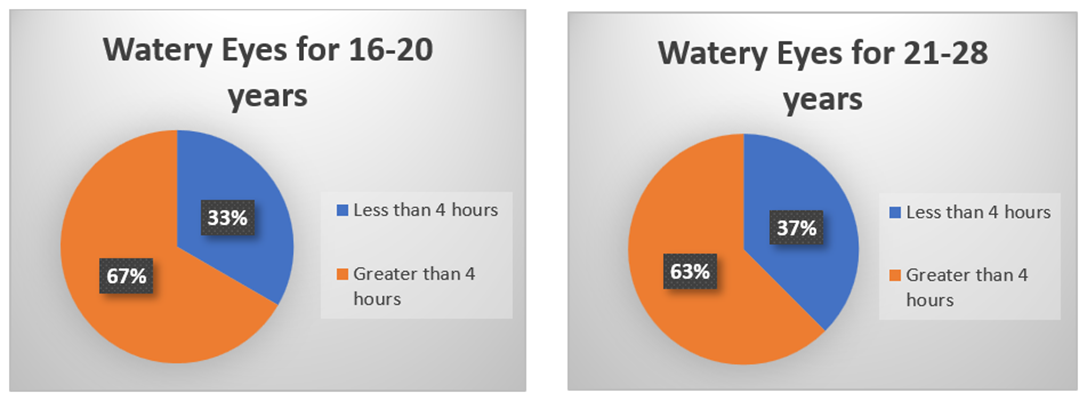
The research indicates that eye-related issues predominantly affect individuals aged 16 to 20 who use mobile devices for over four hours daily, with a prevalence of 67%, while a similar issue impacts 63% of those aged 21 to 28.
This observation suggests a significant association between prolonged mobile use and eye health across these age groups.
Impact of Mobiles usage on the Activity levels ( Fatigue and lethargy)
More than 67% of participants, especially those using their phones for more than 4 hours daily, reported feeling tired and lethargic. This group also noted a decline in interest in hobbies and daily activities.
Details are as follows:
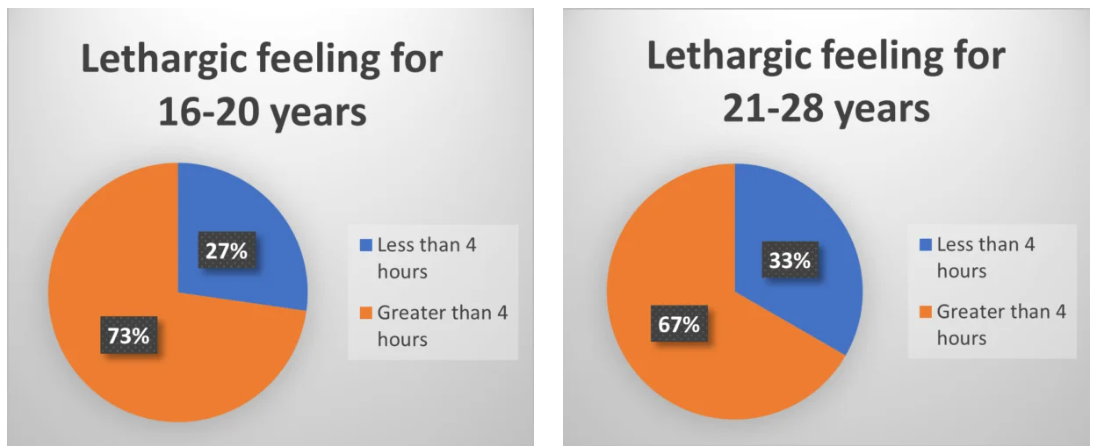
Among all the participants who used phones for more than four hours, 73% of participants aged between 16 to 20 daily reported feeling lethargic, while 63% of those aged 21 to 28 experienced similar symptoms.
This observation indicates a significant impact of prolonged mobile phone use on feelings of lethargy across these age groups. However, the age group of 16 to 20 is more impacted.
Impact of Mobile Usage on the Headache
More than 57% of individuals get frequent headaches especially those using their phones for more than 4 hours daily.
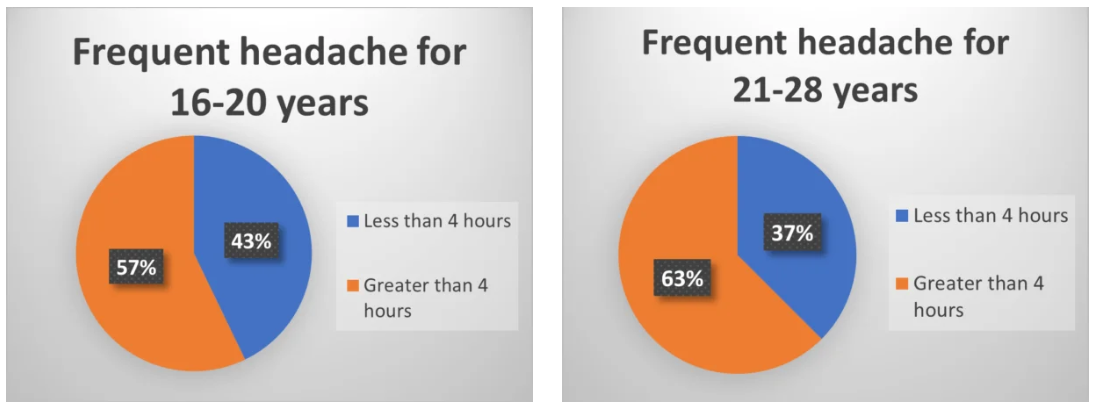
The incidence of frequent headaches among participants using phones for more than four hours daily is significant, with 63% in the 21 to 28 age group and 57% in the 16 to 20 age group.
This observation shows a notable correlation between headaches and the duration of mobile usage.
The study found out that the participants in the age group of 21 to 28 are more affected by this. The reason behind this observation is a matter of further study and research but it could also be due number of years of continuous usage with the same pattern.
3. Psychological Impacts
Influence of Content:
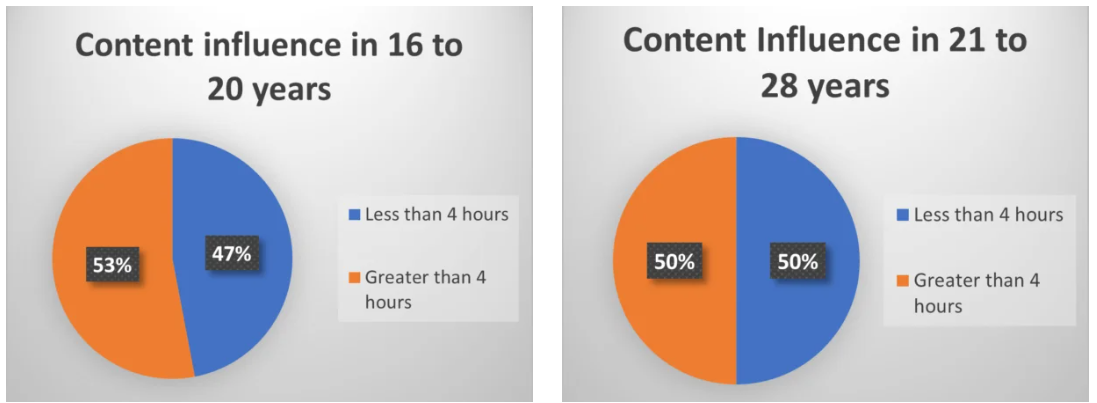
Among all the participants who used phones for more than four hours, 53% of participants aged between 16 to 20 years felt the content they viewed influenced their life, while 50% of those aged 21 to 28 reported the same.
Social Validation:
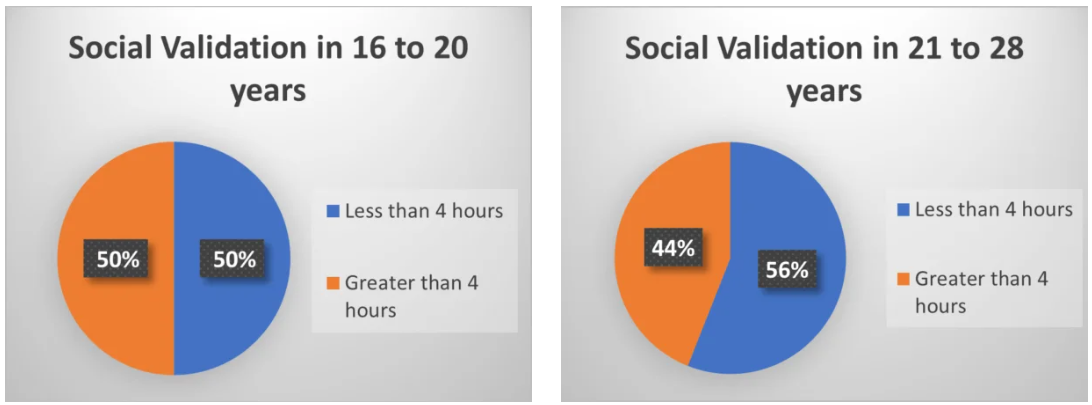
Among participants who used phones for more than four hours daily, 50% of individuals aged 16 to 20 reported experiencing a sense of validation through their phone usage. In comparison, 44% of participants aged 21 to 28 also reported a similar feeling of validation from their phone use.
Dependence and Anxiety:
The usage of mobile phones showed the dependency of various populations in their daily lives. Participants reported feeling anxious when they were unable to access their devices, indicating a deep-rooted reliance/over dependency on mobile technology for emotional well-being.
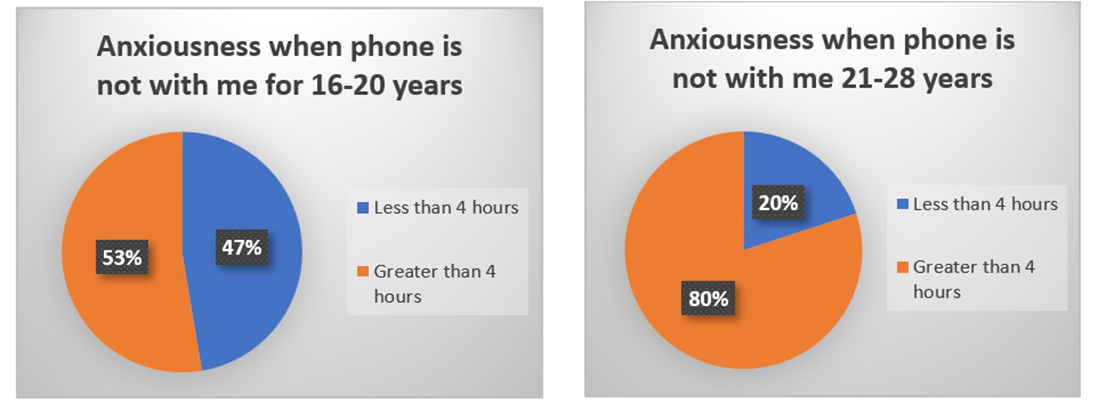
According to the survey, results indicate that approximately 80% of participants aged 21 to 28 who used their phones for more than four hours daily experienced anxiety when their phones were not available, compared to 53% of participants aged 16 to 20 with similar phone usage patterns. This suggests that individuals across both age groups who use mobile phones for extended periods are significantly more likely to experience anxiety in the absence of their devices.
The study found that the participants in the age group of 21 to 28 are more affected by this. The reason behind this observation is a matter of further study and research but it could also be due number of years of continuous usage with the same pattern.
4. Impact on Daily Life, studies, and Work
Mood Swings:
Mobile phones have transformed daily life, work, and studies with both positive and negative effects.
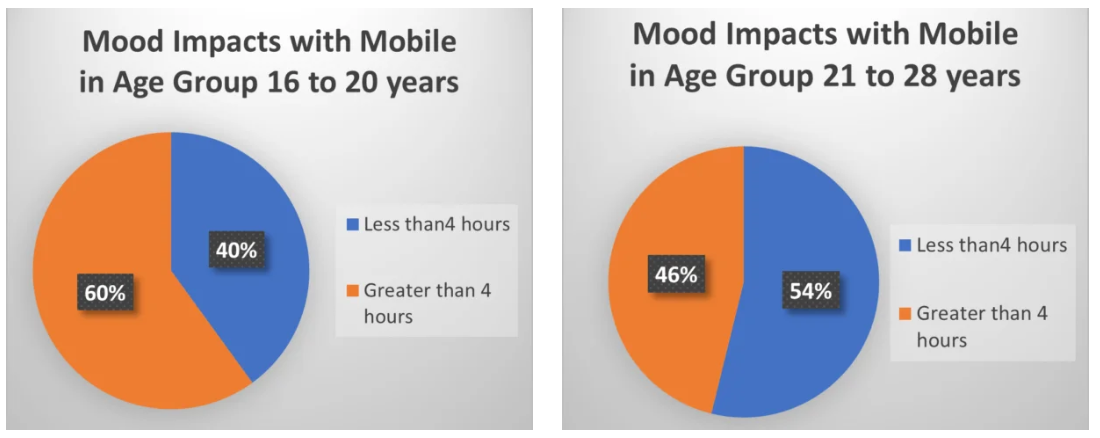
As observed, 60% of participants face Mood Impacts by the usage of a phone for more than 4 hours for the age group of 16-20 years whereas 54% of participants observed Mood impacts even with the usage of less than 4 hours in elder age group of 21 to 28 years.
Therefore, it can be concluded that psychological impacts are evident at the elderly stage in the 21 to 28 age group, despite their shorter duration of mobile use, compared to the 16 to 20 age group.
5. Life Without Mobile Phone
It was observed that, 59% believed that life would be inconvenient without a mobile phone, 27% felt it would be more peaceful, and 14% thought it would be boring. Overall, the findings suggest that the majority of mobile phone users perceive their devices as essential for convenience and ease, though this reliance may also contribute to a sense of mental complacency.
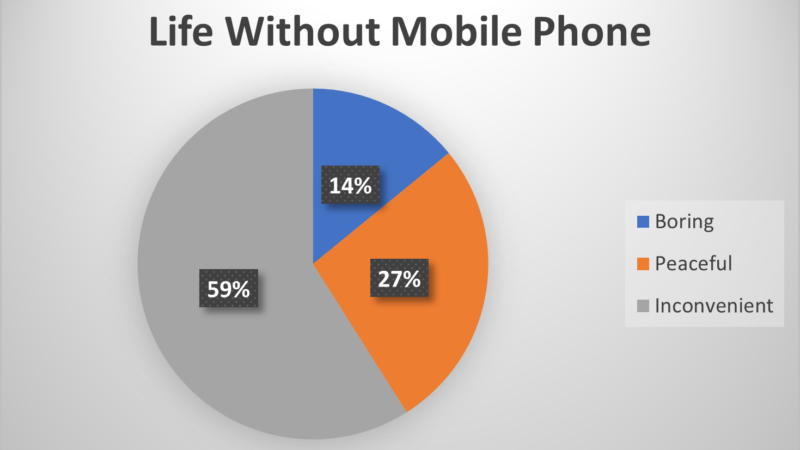
Final Conclusion:
Overall, on the basis of the survey and data, we conclude that usage of mobile phone and their pattern of usage impacts the life of people physically, psychologically, and emotionally and the observation was consistent in both the age groups 16 to 20 years and 21 to 28 years.
Moreover, it was evident that the participants with higher hours of usage mainly more than 4 hours demonstrated more physical and psychological impacts, compared to those who used phones for less than 4 hours.
Whereas the 16 to 20 years age group was observed much affected by psychological issues like content influence, and social validation.
Further, Signs of dependency and anxiety were more evident in the elderly age group of 21 to 28 years even when the usage is less than 4 hours.
Recommendations:
- Mobile phones should be used as tools for communication, then entertainment.
- Increased screen time can lead to physical and psychological alterations. Screen time should be limited to the least possible. Recommended screen time is less than 4 hours a day.
- Choose the content you view very wisely.
- Do not let your emotions get influenced by the negative content you view.
- Avoid watching content that makes you sad, angry, jealous, revengeful, fear, anxiety, frustration, guilt.
- Do prefer to watch the content that generates positive emotions like joy, happiness, and motivation should be the content of choice.
- Do not let your emotions get influenced by the negative content you view.
Author
 |
Dr. Ashita Nandgaonkar – BHMS, MS in psychological counseling Dr. Ashita Nandgaonkar is a highly esteemed homeopathic doctor with a passion for holistic healing and patient-centered care. Dr. Nandgaonkar remains dedicated to raising awareness about the benefits of homeopathy and promoting its integration into mainstream healthcare. Her mission is to empower individuals on their journey to health and wellness, embracing the holistic approach that homeopathy offers. She has a special interest in researching Homeopathic solutions for diseases that are difficult to treat with conventional medicines and therapies. |
 |
Dr. Divya Choyan – PHARM. D Dr. Divya Choyan has a strong foundation in clinical research and regulatory affairs. She has certifications in clinical trials and data management and is passionate about improving medication safety and patient care. |
 |
Ashriya Sinha & Anshika Sharma Ashriya Sinha student of DP 2 / 12th grade coordinated questionnaire formation and data collection activities for the research. Anshika is an aspiring designer pursuing Bachelor of Design (B.Des) at UID Gandhinagar. With a strong passion for creativity, she has actively contributed to data collection from young individuals, helping to gather valuable insights and understand their perspectives. |
Content Medically Reviewed By MedicoExperts Editorial & Clinically Review Board




